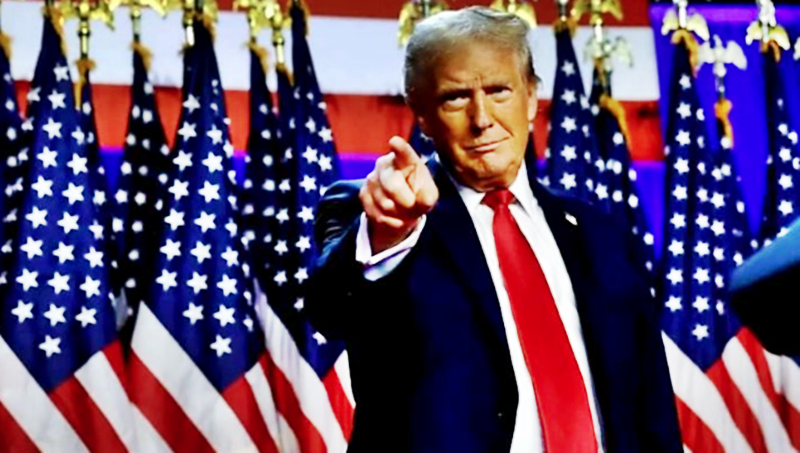Anynomous pro-Trump Norwegian on Tariff Plan.

By Pro-Trump Anonymous Norwegian-Human Synthesis-05 April 2025
Donald Trump's tariff plan signifies the end of the socialist ideology that has shaped Western international trade policy for decades. The tariff system in which the U.S. has paid much higher tariffs than so-called poor nations has been an unfair system.
It has resulted in the U.S. facing significantly higher tariff rates when exporting its goods to other countries, while those same countries pay very low tariffs when exporting goods to the U.S.
In other words, the U.S. has paid for countries like China to enrich themselves, while American citizens have become significantly poorer and lost their industries and job opportunities. President Trump’s goal is to eliminate the unfairness of unequal tariffs and return to the classic Western capitalist concept of equal treatment regardless of which country you come from. The playing field should be level for everyone.
Let me explain what I mean, which describes one side of this issue. We’ve had a system where the U.S. pays much higher duties than other countries because we’ve followed the socialist idea that "the rich should pay for the poor."
Throughout the post-war period, this has been a recurring idea, strongly influenced by the notion that power structures come in pairs—one weak, one strong. This was conceptualized by neo-Marxist Jacques Derrida, who is also considered the father of multiculturalism.
The neo-Marxists believed that power structures in society should be overturned. If “the man” was considered the strong and “the woman” the chronically weak in a power pair, then the woman should be elevated and the man suppressed. Similarly, the “immigrant” should be highlighted and excused when breaking the law, while the viewpoints and thoughts of “ethnic Europeans” should be suppressed—because the immigrant was “to be pitied.”
And that may have been the case at times, but that doesn’t mean an immigrant is always innocent. Another example related to international trade is the same neo-Marxist assumption that "rich countries" must always help "poor countries."
The idea was that if everyone helped each other, the world would eventually become a socialist-Marxist utopia where we all lived together in peace and harmony. Without God. That part is important to Marxists: in such a society, traditional values or belief in God should no longer exist. The state is to become god, and we are all to worship at the altar of the state.
This is, of course, a generalization—there are many facets to this topic—but the generalization helps provide an understanding of the big picture.
But even if women were oppressed several generations ago—if that’s true—that doesn’t mean women are oppressed today. If immigrants were to be pitied many years ago, that doesn’t mean today’s non-Western criminals who commit assaults or rapes should be excused and not deported.
The greatest flaw of the neo-Marxist mindset is its rigid, unchanging concept that power relations never change. That the “weaker party” is ALWAYS women, immigrants, etc., while the stronger party is always men, ethnic Europeans, and so on. According to the theory, the strong must ALWAYS be suppressed in the pursuit of the eternally just, godless society.
The term "oppression" is used because it was the word neo-Marxist Herbert Marcuse used when writing about how important it was to discriminate against the majority population to elevate the desired minority. In his case, the neo-Marxists. They were to overcome the conservative majority in society in the 1960s by suppressing their freedom of speech and viewpoints.
We’ve lived with this ever since, with the media acting as experts in this socialist tactic to this very day.
Now back to how this mindset has influenced global trade: Even if China was poor several generations ago, they are certainly not poor today.
Power dynamics shift over time. Communist China is now on the verge of becoming the world’s dominant power, while the U.S. and Europe are losing their position.
The Marxist-socialist ideology has had a significant impact on world trade. When globalism emerged in the mid-1980s, we were told that wealthy countries should contribute to the economic development of poorer nations and help create a more just economic landscape.
As the World Trade Organization (WTO) became increasingly influenced by socialist ideology, it was deemed necessary that “weak and poor” nations like China and India should pay lower export tariffs than rich nations.
When China exported to the U.S., tariff rates were to be lower than when a wealthy country like the U.S. exported to China. The underlying principle was that by imposing different tariffs, the rich would finance the growth of the poor, and eventually, the entire world would become a “happy socialist utopia” where everyone is equal.
This has not happened. As we know, we do not live in a socialist utopia, and it was a particularly bad idea to dismantle our national defenses and Europe’s defense systems. We now stand as losers because we followed this foolish ideology that preached “peace in our time.”
Instead, the U.S. has been slowly depleted, while the Chinese are taking over global economic leadership. It is in Eastern China that nearly everything we need is manufactured.
Since the mid-1980s, enormous values have been redistributed from the West to the East, as Western industry has largely been shut down and moved to the East, where labor is cheaper. Those who have profited from this are China, India, and other countries where factories and technology were relocated—as well as the billionaires in the West who own the Western companies.
This has contributed to what I describe in my international bestseller, The World of Billionaires, where individuals have become enormously rich while the average Western population has become significantly poorer.
During this period, the U.S. has experienced a marked decline in living standards and employment opportunities, leading to alarming increases in American poverty.
The working class has been systematically impoverished, while the profits have gone to China and the Western billionaire elite, without redistribution back to American citizens. Moreover, billionaire-owned companies are often registered in tax havens, allowing them to avoid taxation.
This is exactly the phenomenon that President Donald Trump aims to reverse in his attempt to halt America's decline and make it attractive to invest in American industry again.
Trump wants to eliminate this socialist injustice and return to the classical Western capitalist concept of equal treatment in a merit-based society. If you are the best and most competent, you should get the job, regardless of race or gender. Trump wants to establish a system of reciprocity, where the U.S. demands the same high tariff rates from a specific nation as that nation imposes on U.S. imports.
The underlying principle is that if China lowers its tariffs on American goods, the U.S. will implement the same rate when Chinese goods come into the country. This will restore equality in global trade, preventing some nations from enriching themselves at the expense of others.
The idea is that all people—regardless of race, ethnicity, gender, or social status—should compete on equal terms. It is not the U.S.’s job to unfairly pay for China’s growth. All nations should compete on a level playing field. That is a fundamental Western principle that Trump is now returning to in order to reverse the dramatic decline of the United States.
